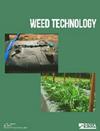Extension event attendance increases adoption of weed management practices by sports field managers
IF 1.7
3区 农林科学
Q3 AGRONOMY
引用次数: 0
Abstract
Abstract Data from a national survey of 348 U.S. sports field managers were used to examine the effects of participation in Cooperative Extension events on the adoption of turfgrass weed management practices. Of the respondents, 94% attended at least one event in the previous three years. Of this 94%, 97% reported adopting at least one practice as a result of knowledge gained at an Extension turfgrass event. Half of the respondents adopted four or more practices; a third adopted five or more practices. Non-chemical, cultural practices were the most-adopted practices (65% of respondents). Multiple regression analysis was used to examine factors explaining practice adoption and Extension event attendance. Compared to attending one event, attending three events increased total adoption by an average of one practice. Attending four or more events increased total adoption by two practices. Attending four or more events (compared to one event) increased the odds of adopting six individual practices by 3- to 6-fold, depending on the practice. This suggests practice adoption could be enhanced by encouraging repeat attendance among past Extension event attendees. Manager experience was a statistically significant predictor of the number of Extension events attended, but a poor direct predictor of practice adoption. Experience does not appear to increase adoption directly, but indirectly, via its impact on Extension event attendance. In addition to questions about weed management generally, the survey asked questions about annual bluegrass management, specifically. Respondents were asked to rank seven sources of information for their helpfulness in managing annual bluegrass. There was no single dominant information source, but Extension was ranked as the most helpful more than any other source (by 22% of the respondents) and was ranked among the top three by 53%, closely behind field representative/local distributor sources at 54%.扩大活动出席增加采用杂草管理措施的运动场管理者
来自348名美国体育场地经理的全国性调查数据被用来检验参与合作推广活动对采用草坪草杂草管理实践的影响。在受访者中,94%的人在过去三年中至少参加过一次活动。在这94%中,97%的人报告说,由于在推广草坪活动中获得的知识,他们至少采用了一种做法。一半的受访者采用了四种或更多的做法;三分之一的人采用了五种或更多的做法。非化学的、文化的做法是采用最多的做法(65%的受访者)。多元回归分析检验了实践采用和推广活动出席的影响因素。与参加一个活动相比,参加三个活动平均增加了一个实践的总采用率。参加四个或更多的活动增加了两个实践的总采用率。参加四个或更多的活动(与一个活动相比)将采用六个单独实践的几率提高了3到6倍,这取决于实践。这表明可以通过鼓励过去的扩展活动参与者重复出席来提高实践的采用。经理经验是参与的扩展事件数量的统计上显著的预测因子,但是对实践采用的直接预测因子很差。经验似乎不会直接增加采用,而是通过其对扩展活动出席率的影响间接增加采用。除了关于杂草管理的问题外,调查还特别询问了关于每年蓝草管理的问题。受访者被要求根据对管理年度蓝草的帮助程度对七个信息来源进行排名。没有单一的占主导地位的信息源,但扩展被评为最有帮助的信息源(22%的受访者),并以53%的比例排在前三名,紧随54%的现场代表/当地分销商。
本文章由计算机程序翻译,如有差异,请以英文原文为准。
求助全文
约1分钟内获得全文
求助全文
来源期刊

Weed Technology
农林科学-农艺学
CiteScore
2.90
自引率
21.40%
发文量
89
审稿时长
12-24 weeks
期刊介绍:
Weed Technology publishes original research and scholarship in the form of peer-reviewed articles focused on understanding how weeds are managed.
The journal focuses on:
- Applied aspects concerning the management of weeds in agricultural systems
- Herbicides used to manage undesired vegetation, weed biology and control
- Weed/crop management systems
- Reports of new weed problems
-New technologies for weed management and special articles emphasizing technology transfer to improve weed control
-Articles dealing with plant growth regulators and management of undesired plant growth may also be accepted, provided there is clear relevance to weed science technology, e.g., turfgrass or woody plant management along rights-of-way, vegetation management in forest, aquatic, or other non-crop situations.
-Surveys, education, and extension topics related to weeds will also be considered
 求助内容:
求助内容: 应助结果提醒方式:
应助结果提醒方式:


